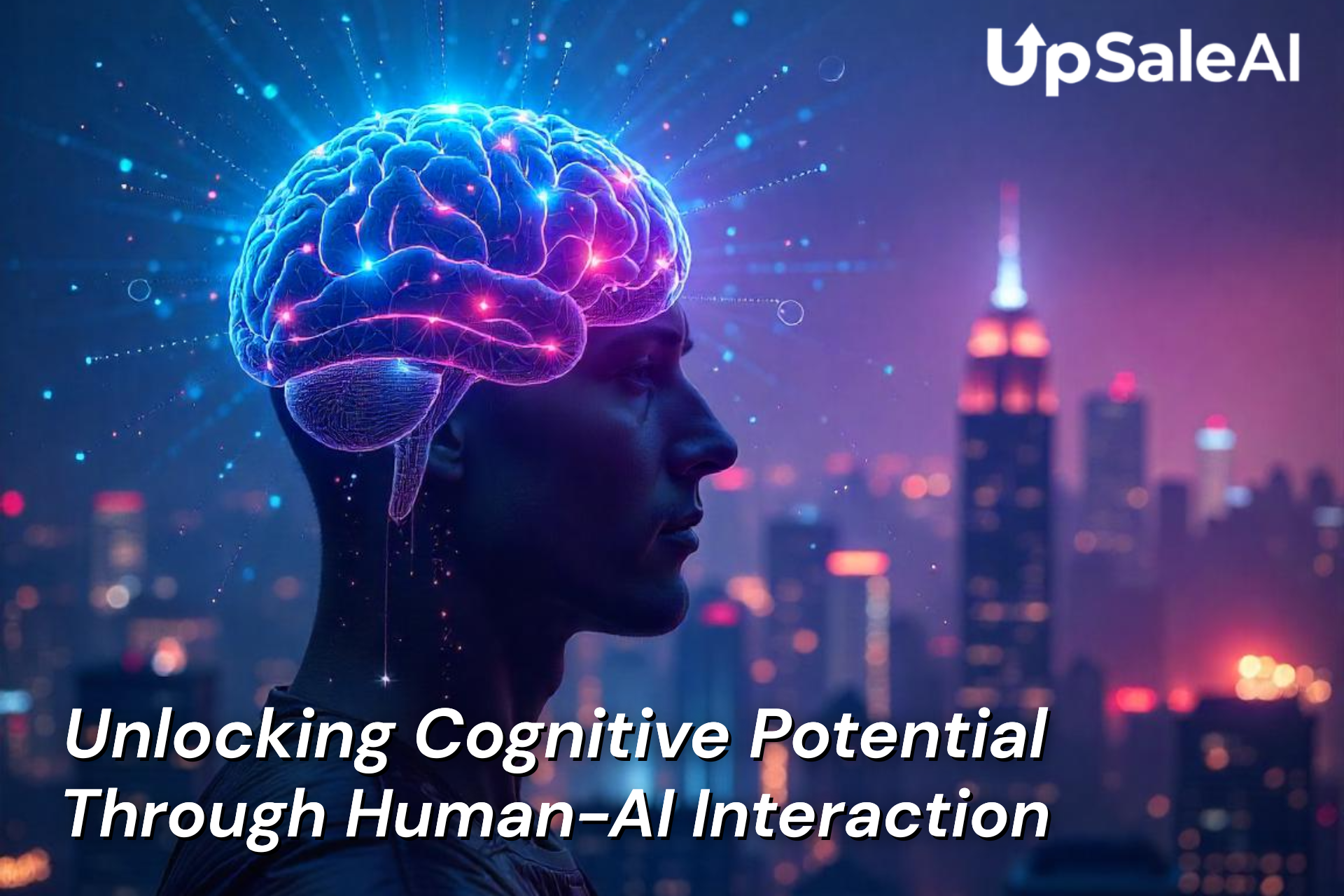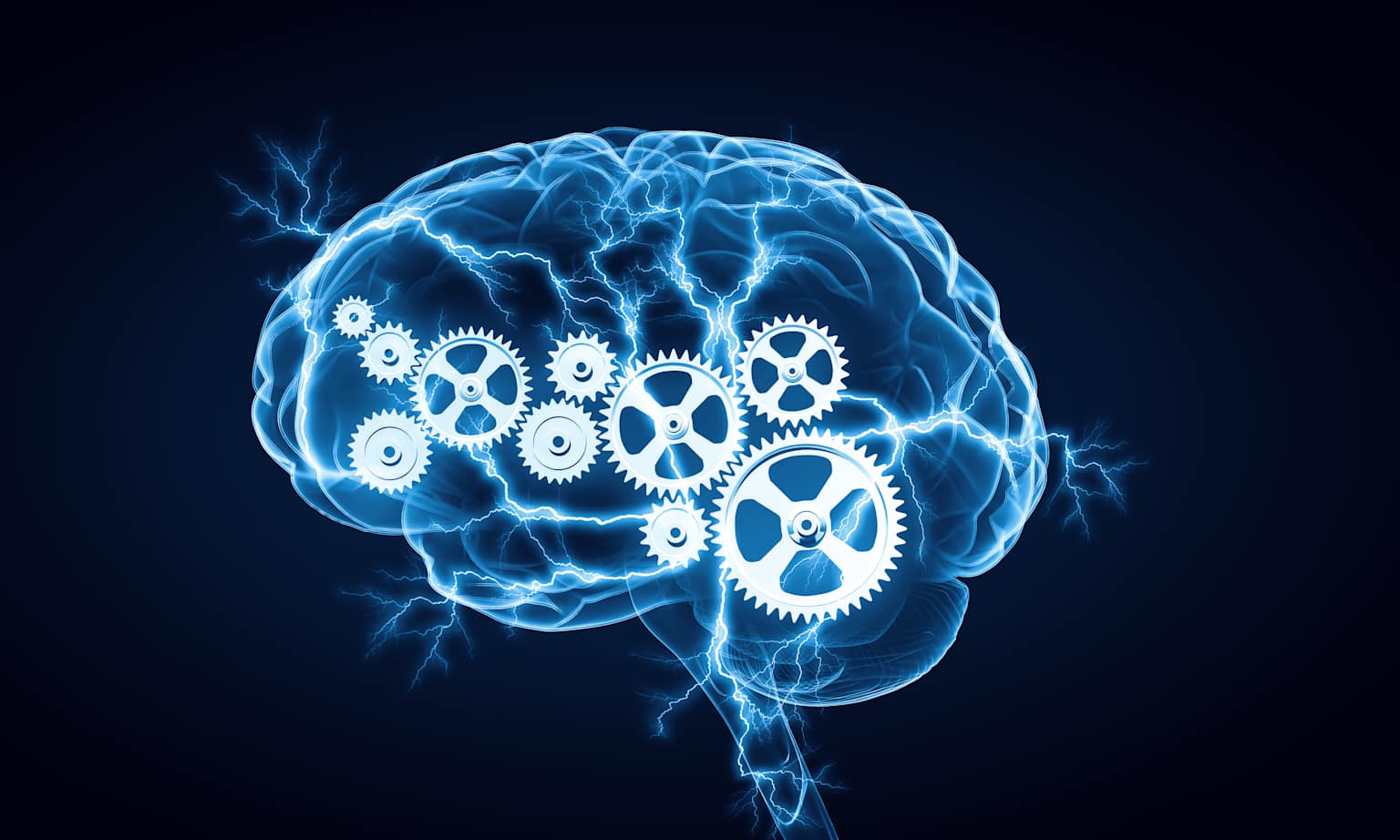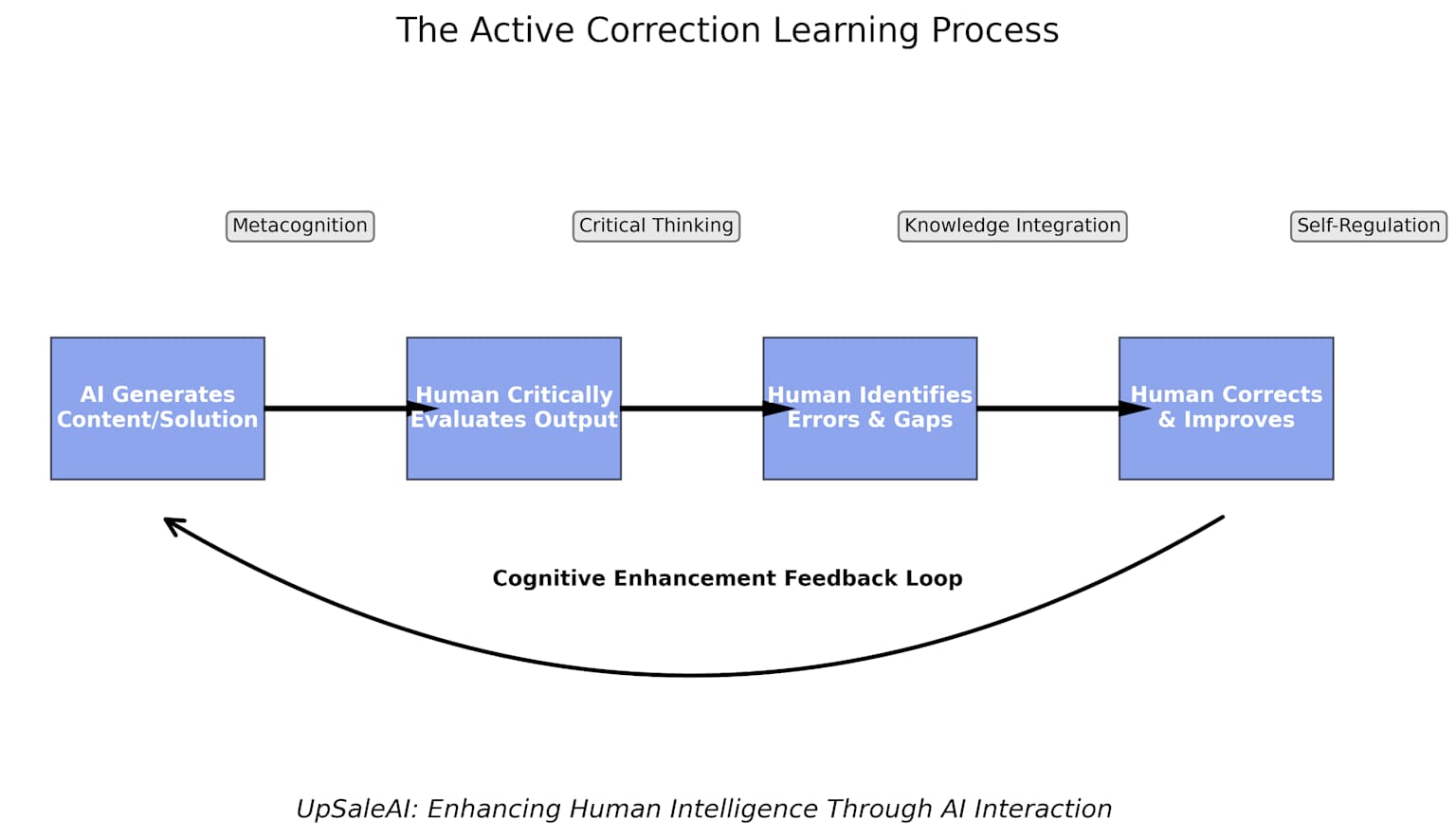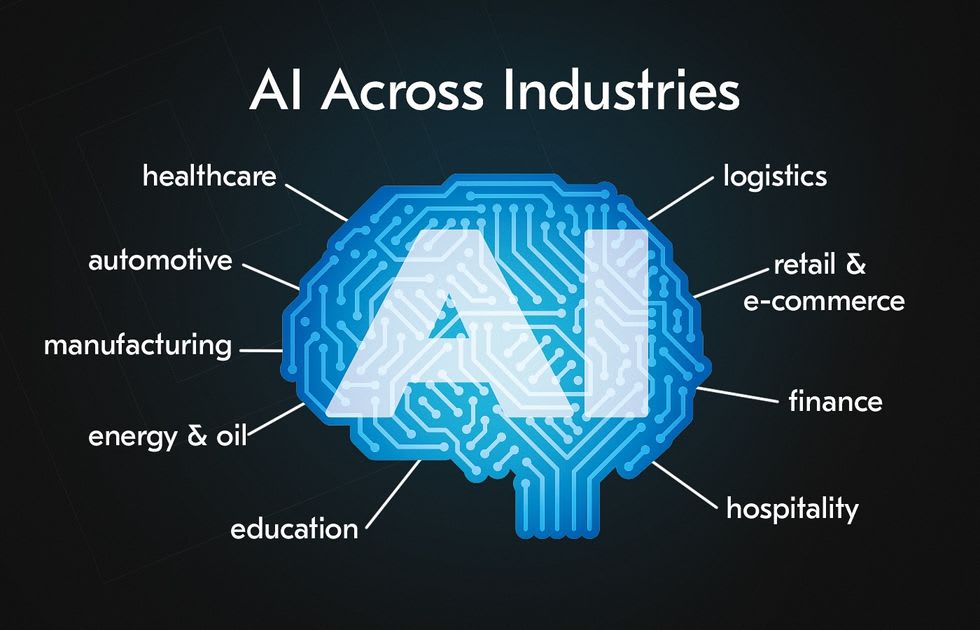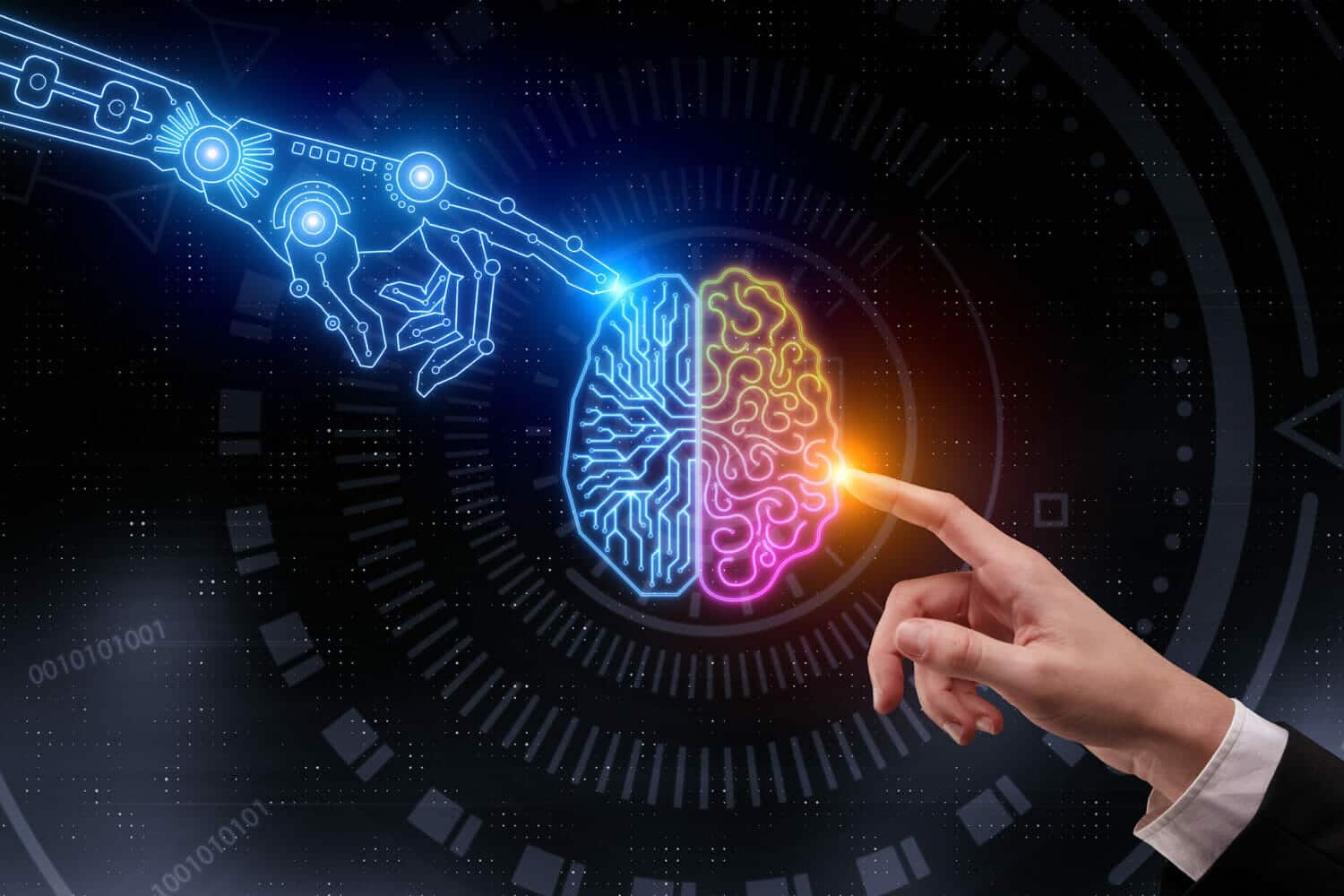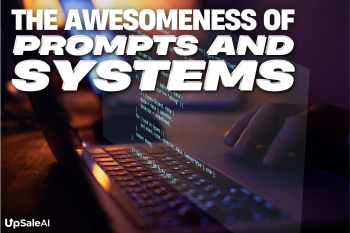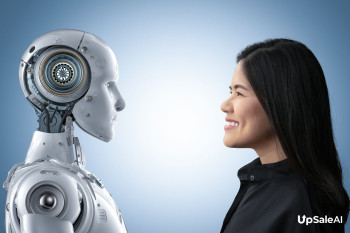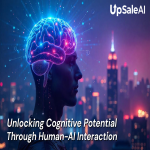Recent research suggests that actively engaging with and correcting AI outputs can significantly enhance human cognitive abilities, offering a promising avenue for accelerated learning and skill development across various domains.
Theoretical Foundations of AI Learning
The cognitive benefits of human-AI interaction are grounded in several well-established learning theories that explain how this process enhances human intelligence and cognitive development.
Constructivism, a foundational learning theory, posits that knowledge is actively constructed through experience and reflection1. When humans interact with AI systems, particularly in correcting or improving AI outputs, they engage in active knowledge construction rather than passive information consumption. This process of critically evaluating AI responses and formulating improvements stimulates deeper understanding and retention of information.
Social Cognitive Theory, developed by Albert Bandura, emphasizes learning through observation, modeling, and social interaction1. AI systems provide novel models of thinking and problem-solving that humans can observe, critique, and improve upon. This interaction creates a unique form of social learning where the AI serves as both a cognitive tool and a learning partner, challenging and expanding human cognitive capabilities.
Information Processing Theory, which conceptualizes learning as involving the encoding, storage, and retrieval of information, is particularly relevant to AI-human interaction1. The process of verifying and correcting AI outputs requires active retrieval and comparison of information stored in human memory. This strengthens neural pathways and enhances long-term retention of knowledge.
Cognitive Load Theory, which focuses on optimizing learning by managing cognitive resources, is also applicable1. AI systems can handle routine information processing tasks, allowing humans to allocate their cognitive resources to higher-order thinking and more complex problem-solving. This division of labor between human and artificial intelligence can lead to more efficient learning and cognitive development.
Self-Regulated Learning Theory emphasizes the importance of learners setting goals, monitoring progress, and adjusting strategies1. Interacting with AI systems, particularly in correcting their outputs, develops these self-regulation skills as individuals must constantly evaluate their own knowledge against the AI's responses and adjust their understanding accordingly.
The concept of "desirable difficulties" in learning, established by Bjork & Bjork, aligns well with the cognitive benefits of AI interaction1. The effort required to correct AI outputs creates productive challenges that lead to stronger long-term retention of knowledge and improved cognitive processing.
Recent neuroimaging studies have provided further evidence of cognitive enhancement through AI interaction. A study showed significant improvements in executive functioning and working memory among participants who engaged in AI-assisted learning courses2. These improvements were associated with increased activation in prefrontal cortical regions, suggesting that AI interaction can lead to measurable changes in brain function.
Moreover, the process of explaining why AI responses are incorrect engages similar self-explanation processes that have been shown to significantly improve learning outcomes1. This aligns with findings from Chi et al. (1994), demonstrating the power of self-explanation in enhancing understanding and retention.
By leveraging these theoretical foundations, the interaction between humans and AI creates a powerful synergy that enhances cognitive abilities, promotes deeper learning, and ultimately makes humans smarter. As AI technologies continue to evolve, understanding and applying these learning theories will be crucial in designing AI systems that not only assist but also actively contribute to human cognitive enhancement.
Empirical Evidence of Cognitive Benefits
Empirical studies have provided compelling evidence for the cognitive benefits of human-AI interaction, particularly in the context of error correction and critical evaluation. These findings support the theoretical foundations discussed earlier and demonstrate tangible improvements in human cognitive abilities.
A study by Chi et al. (1994) showed that self-explanation during problem-solving significantly enhances learning outcomes1. This process is mirrored when individuals explain why AI responses are incorrect, engaging in similar self-explanation processes that deepen understanding and retention of information.
Metcalfe's (2017) research revealed that error correction produces better learning outcomes than errorless learning1. This supports the notion that identifying and correcting AI errors creates productive learning challenges, leading to more robust cognitive development.
The concept of "desirable difficulties" in learning, established by Bjork & Bjork (2011), aligns well with the cognitive benefits of AI interaction1. The effort required to correct AI outputs creates these desirable difficulties, leading to stronger long-term retention of knowledge and improved cognitive processing.
Dunlosky et al. (2013) identified active retrieval practice as one of the most effective learning strategies1. The process of retrieving correct information to verify AI responses strengthens memory in a similar manner, enhancing overall cognitive performance.
Recent neuroimaging studies have provided further evidence of cognitive enhancement through AI interaction. A 2023 study showed significant improvements in executive functioning and working memory among participants who engaged in AI-assisted learning courses2. These improvements were associated with increased activation in prefrontal cortical regions, suggesting that AI interaction can lead to measurable changes in brain function.
In the field of quantum computing, AI models such as convolutional neural networks (CNNs) have been shown to drastically reduce error correction decoding times3. This not only improves the efficiency of quantum systems but also enhances human understanding of complex quantum processes, demonstrating how AI can augment human cognitive capabilities in highly specialized domains.
A comprehensive analysis of AI's impact on clinical work revealed that strategic AI integration can significantly reduce cognitive and work burden for healthcare professionals4. This reduction in cognitive load allows clinicians to focus on higher-order thinking and decision-making, ultimately improving patient care and outcomes.
It's important to note that while AI can enhance human cognition, it also presents challenges. As AI systems grow more sophisticated, they may become better at translating capabilities to different situations in ways similar to human cognition5. This underscores the need for continued research into the dynamics of human-AI collaboration to ensure that AI remains a tool for cognitive enhancement rather than replacement.
These empirical findings collectively demonstrate that active engagement with AI systems can lead to significant improvements in human cognitive abilities, ranging from enhanced memory and critical thinking skills to improved problem-solving capabilities in complex domains.
Mechanisms of Active Engagement
The cognitive benefits of human-AI interaction are rooted in several key mechanisms of active engagement that stimulate learning and enhance cognitive abilities:
Critical Evaluation: When correcting AI outputs, individuals engage in critical thinking processes that involve analyzing information, identifying errors, and formulating reasoned arguments. This active evaluation strengthens analytical skills and deepens understanding of the subject matter1.
Metacognition: The process of correcting AI responses encourages metacognitive reflection, where individuals become more aware of their own thought processes and knowledge gaps. This self-awareness is crucial for effective learning and cognitive development2.
Elaborative Rehearsal: Explaining why an AI response is incorrect requires individuals to retrieve and elaborate on their existing knowledge. This process, known as elaborative rehearsal, strengthens neural connections and enhances long-term memory retention1.
Cognitive Flexibility: Interacting with AI systems that may approach problems differently from humans promotes cognitive flexibility. Users learn to consider alternative perspectives and adapt their thinking strategies, enhancing their ability to solve complex problems3.
Active Retrieval: Verifying AI responses necessitates the active retrieval of information from memory, a process that has been shown to significantly strengthen long-term retention and recall abilities1.
Error-Driven Learning: Identifying and correcting AI errors creates productive learning challenges. This error-driven learning process has been demonstrated to lead to more robust and durable learning outcomes compared to passive information consumption1.
Scaffolded Learning: AI systems can provide scaffolding for learning by handling routine information processing, allowing humans to focus on higher-order thinking and gradually take on more complex cognitive tasks1.
Continuous Feedback Loop: The iterative process of interacting with and correcting AI creates a continuous feedback loop that promotes ongoing learning and skill refinement2.
Cross-Domain Knowledge Transfer: Engaging with AI across various domains encourages the transfer of knowledge and problem-solving strategies between different areas, enhancing overall cognitive flexibility and adaptability3.
Cognitive Load Management: By offloading certain cognitive tasks to AI, humans can better manage their cognitive load, allowing for more efficient processing and learning of complex information4.
These mechanisms work synergistically to enhance human cognitive abilities through AI interaction. As individuals actively engage in these processes, they not only improve their understanding of specific subjects but also develop generalizable cognitive skills that can be applied across various domains and real-world scenarios.
Real-World Applications of AI
The integration of AI technologies into various industries has led to significant advancements in human capabilities and efficiency across multiple domains. In healthcare, AI-powered diagnostic tools have enhanced clinicians' ability to detect diseases early and accurately. For instance, AI algorithms have demonstrated remarkable accuracy in identifying breast cancer from mammograms, sometimes outperforming human radiologists1. This collaboration between AI and medical professionals has not only improved diagnostic accuracy but also reduced the cognitive burden on clinicians, allowing them to focus on complex cases and patient care.
In the field of data analytics, AI has become an invaluable tool for preventing human error and enhancing decision-making processes. Advanced AI systems act as tireless proofreaders, continuously learning from new data inputs to better detect errors and suggest corrections2. This symbiotic relationship between human analysts and AI has led to more accurate insights and reduced the risk of costly mistakes in business intelligence.
The creative industries have also witnessed transformative applications of AI. In design and engineering, AI-driven error detection in Computer-Aided Design (CAD) software has revolutionized the workflow of designers and engineers. Real-time error detection not only enhances accuracy but also accelerates the design process, enabling professionals to focus on innovation rather than tedious error-checking3. This has led to more efficient product development cycles and improved design outcomes.
In the realm of scientific research, AI is pushing the boundaries of human knowledge. In quantum computing, for example, AI models like convolutional neural networks (CNNs) have drastically reduced error correction decoding times4. This not only improves the efficiency of quantum systems but also enhances human understanding of complex quantum processes, demonstrating how AI can augment human cognitive capabilities in highly specialized domains.
The financial sector has leveraged AI for fraud detection and risk assessment, augmenting human decision-making with rapid pattern recognition capabilities. AI algorithms can analyze vast amounts of transaction data in real-time, identifying potential fraud that might escape human notice and allowing financial experts to focus on complex cases that require nuanced judgment5.
In education, AI-powered adaptive learning systems are personalizing the learning experience, adjusting to individual student needs and pace. This technology enables educators to provide more targeted instruction and support, enhancing the overall learning outcomes and cognitive development of students6.
The manufacturing industry has seen significant improvements in quality control and process optimization through AI integration. Machine learning algorithms can predict equipment failures before they occur, allowing for proactive maintenance and reducing downtime. This predictive capability enhances human decision-making in industrial settings, leading to more efficient operations and cost savings5.
These real-world applications demonstrate that AI is not replacing human intelligence but rather augmenting and enhancing it across various sectors. By handling routine tasks, providing data-driven insights, and supporting complex decision-making processes, AI enables humans to focus on higher-order thinking, creativity, and problem-solving. This synergy between human and artificial intelligence is paving the way for unprecedented advancements and innovations across industries.
AI Enhancing Human Intelligence
The evidence strongly suggests that AI is indeed enhancing human intelligence and cognitive capabilities. By serving as a powerful cognitive extension, AI enables us to process and analyze vast amounts of data, leading to enhanced decision-making and problem-solving skills1. This symbiotic relationship between human and machine intelligence is not replacing human cognition, but rather augmenting it, allowing us to focus on higher-order thinking and creativity2.
AI-driven cognitive enhancement tools are reshaping how we learn, work, and approach complex tasks across various domains3. From personalized adaptive learning systems in education to AI-assisted diagnostics in healthcare, these technologies are expanding our cognitive horizons and pushing the boundaries of human knowledge45. As we continue to develop and refine AI systems, it's crucial to maintain a balance that leverages AI's strengths while nurturing uniquely human qualities like emotional intelligence and ethical reasoning6. By embracing AI as a collaborative tool for cognitive enhancement, we are unlocking new potentials for human intelligence and paving the way for unprecedented advancements in our collective capabilities.
